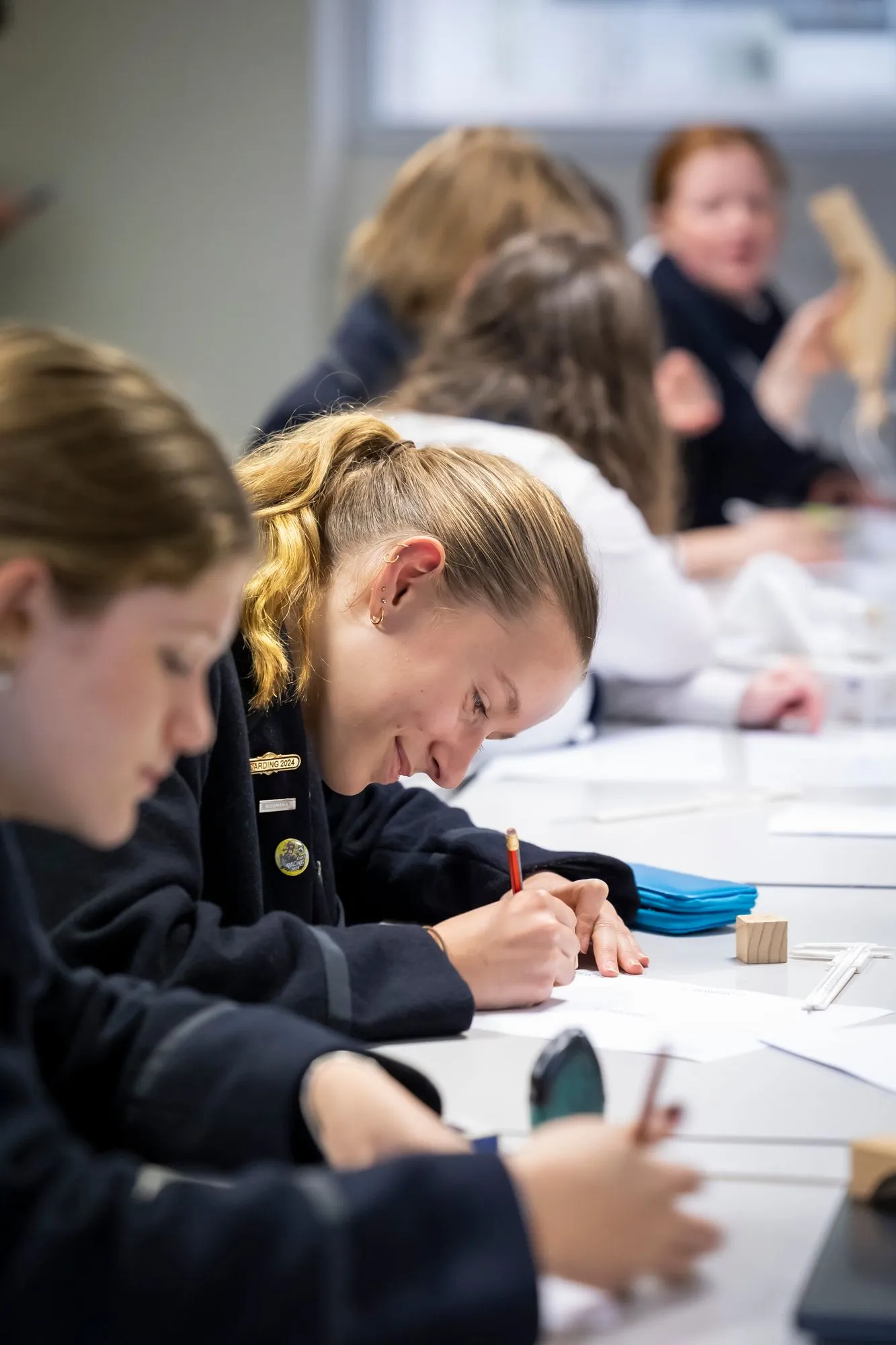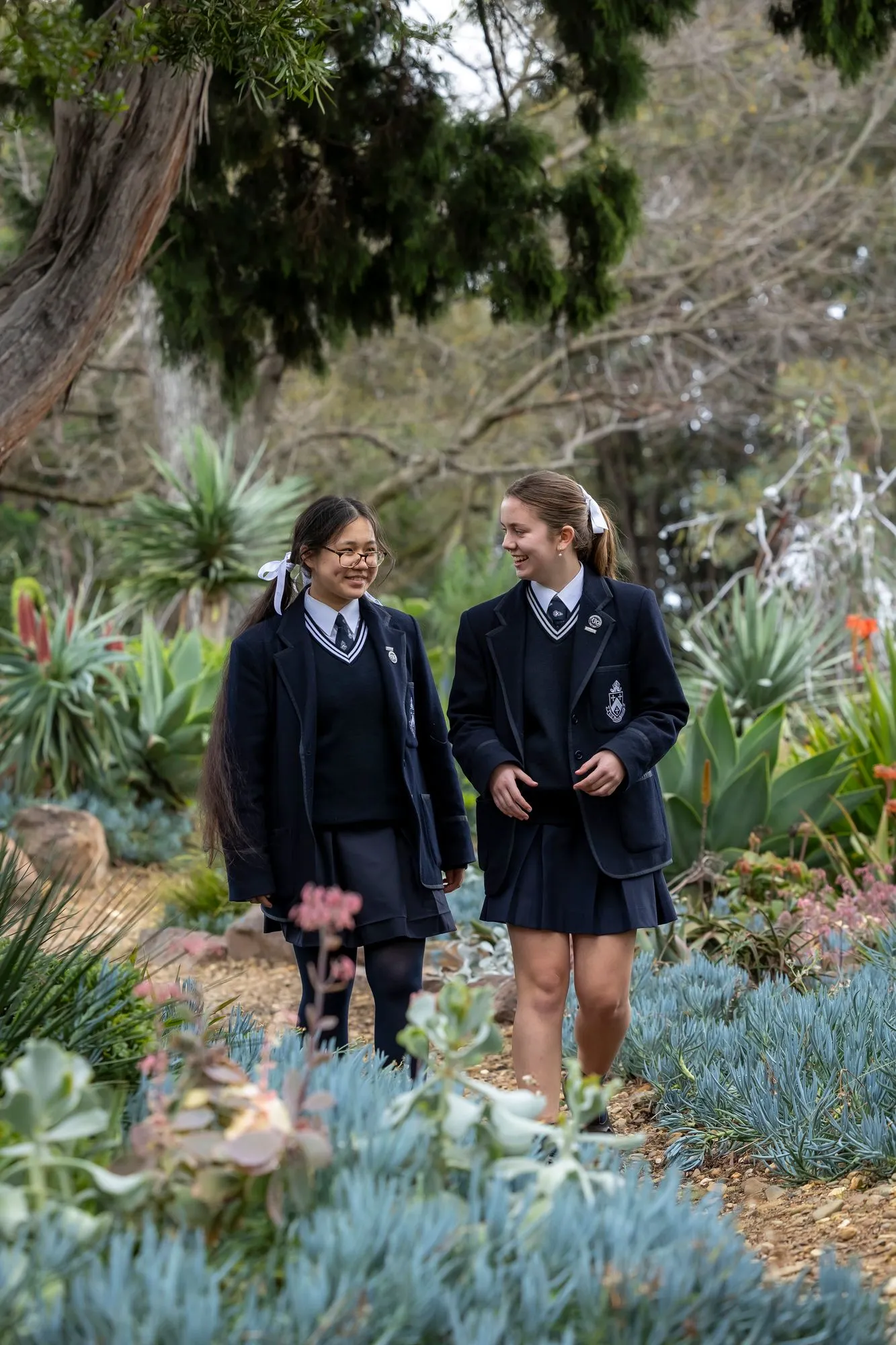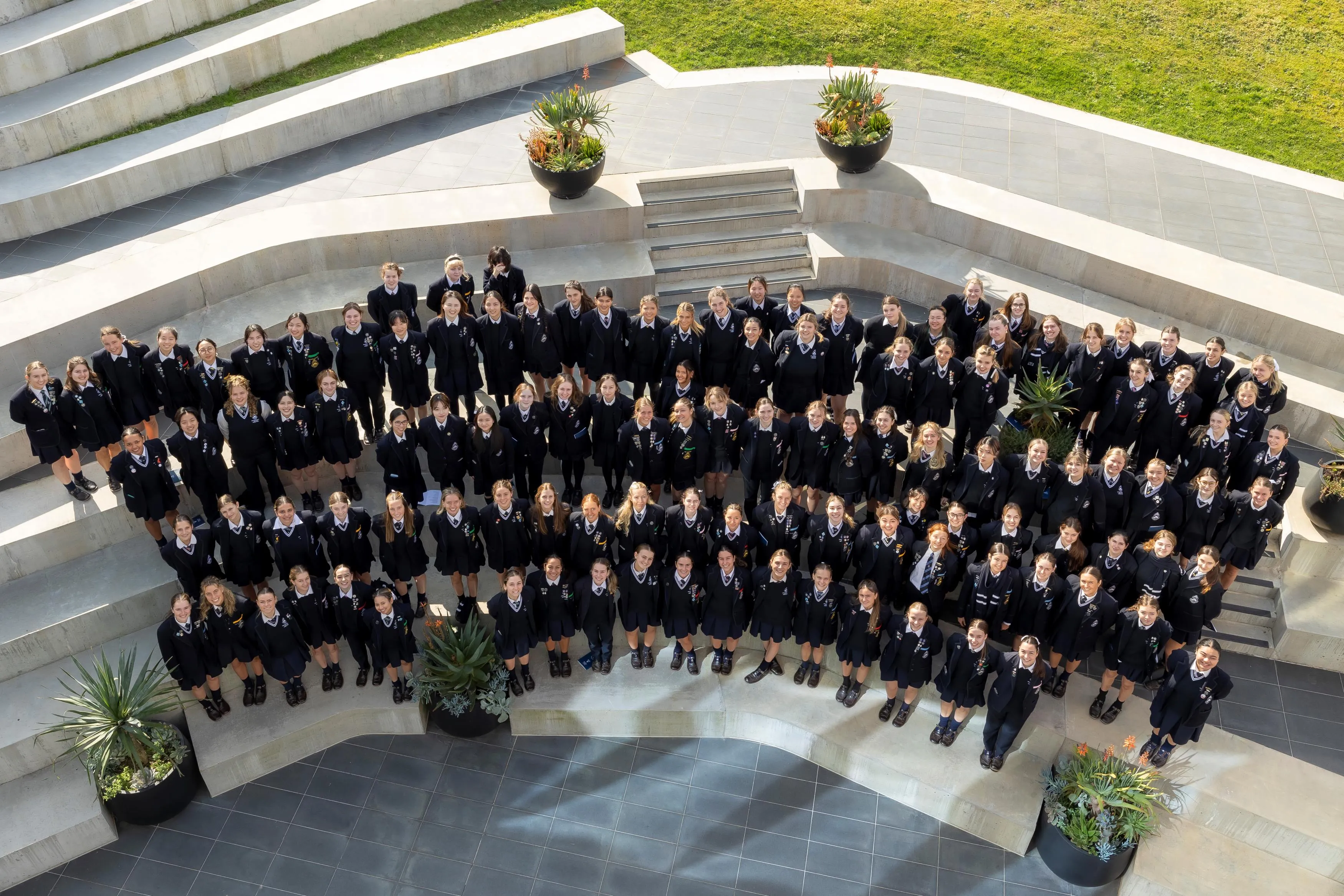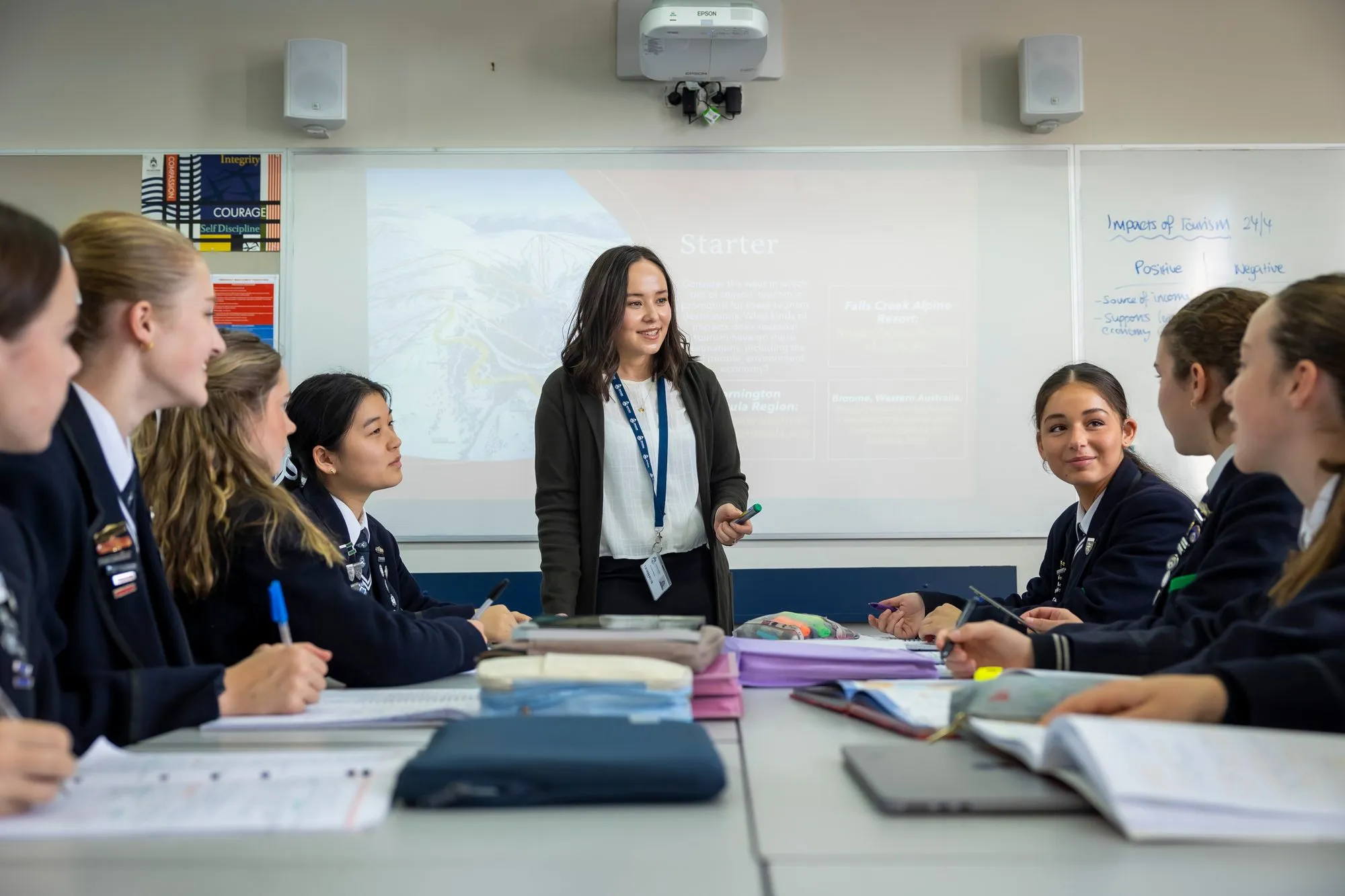

Ms Amanda Watkins tackles the topic of ecotourism with her students in Year 11 Geography.


Ms Amanda Watkins tackles the topic of ecotourism with her students in Year 11 Geography.
Honing the Craft of Teaching
At Melbourne Girls Grammar, we are blessed in so many ways. We teach wonderful students, have access to incredible facilities and, most importantly, attract and retain dedicated and supportive colleagues.
Our Strategic Plan keeps our students at the heart of everything we do, and hence staff go above and beyond to ensure that every Grammarian is known and supported academically and throughout all their endeavours. Their ability to do this effectively is informed by experience and collective efficacy. It is underpinned by a consciously designed professional development program designed to stretch, strengthen and hone the craft of our educational faculty.

Whilst drawing on research and best practice, we know that effective teaching is indeed a craft, so in the development of the professional learning program for the School, respect for this craft is given. Just as tools need to be sharpened, care needs to be given to allow a teacher’s craft to grow and develop. This means balancing the collective needs of the School and its staff with the individual and bespoke needs of our classroom teachers.
"Just as tools need to be sharpened, care needs to be given to allow a teacher’s craft to grow and develop."
Structures and schedules, leadership policies and practices, and shared beliefs and values set the environment in which the community works. In this setting, the trusting and respectful relationships and the support of peers fuel the soul of the community – its intentional learning directed toward student benefits. These factors, working in concert, result in changed teacher practice and, subsequently, increases in student learning.
Whilst drawing on research and best practice, we know that effective teaching is indeed a craft, so in the development of the professional learning program for the School, respect for this craft is given. Just as tools need to be sharpened, care needs to be given to allow a teacher’s craft to grow and develop. This means balancing the collective needs of the School and its staff with the individual and bespoke needs of our classroom teachers.
"Just as tools need to be sharpened, care needs to be given to allow a teacher’s craft to grow and develop."
Structures and schedules, leadership policies and practices, and shared beliefs and values set the environment in which the community works. In this setting, the trusting and respectful relationships and the support of peers fuel the soul of the community – its intentional learning directed toward student benefits. These factors, working in concert, result in changed teacher practice and, subsequently, increases in student learning.
Whilst drawing on research and best practice, we know that effective teaching is indeed a craft, so in the development of the professional learning program for the School, respect for this craft is given. Just as tools need to be sharpened, care needs to be given to allow a teacher’s craft to grow and develop. This means balancing the collective needs of the School and its staff with the individual and bespoke needs of our classroom teachers.
"Just as tools need to be sharpened, care needs to be given to allow a teacher’s craft to grow and develop."
Structures and schedules, leadership policies and practices, and shared beliefs and values set the environment in which the community works. In this setting, the trusting and respectful relationships and the support of peers fuel the soul of the community – its intentional learning directed toward student benefits. These factors, working in concert, result in changed teacher practice and, subsequently, increases in student learning.
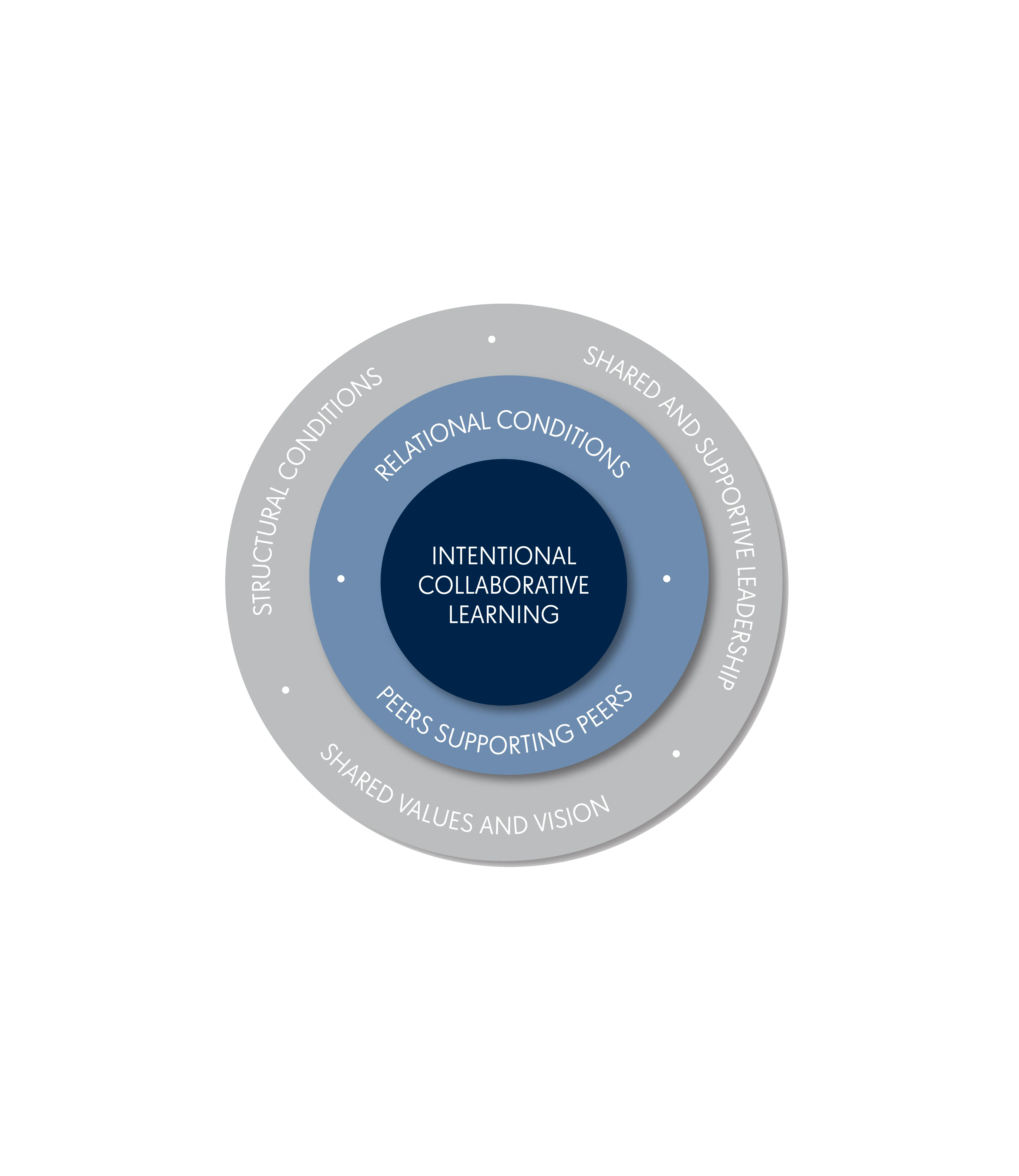

The Intentional Collaborative Learning Model



The Intentional Collaborative Learning Model
*add image of graph above
*add image of graph above
*add image of graph above

With respect to the craft of teaching, we draw inspiration for our professional learning program from the works of Hord and Roy (2013) in Creating Learning Communities. This looks at the importance of structural conditions, shared and supportive leadership, shared values and vision, relational conditions, peers supporting peers, and intentional collaborative learning.
Performance and development plans are established with staff based on their needs and centred around two main goals. The first is a common goal, informed by the School’s overarching goals and aligned to their faculties. The nature of this goal tends to develop staff in what Shulman (1987) would refer to as their content knowledge (the content they teach) or pedagogical content knowledge (knowing how to best teach their subject’s content). The second goal is aligned to the MGGS 'Pedagogical Principles', meaning that the goal is more squarely focused on what Shulman (1987) would refer to as pedagogical knowledge (how to teach). In this way, staff can work deeply both within and across faculty groupings to ensure that they get the best possible exposure to excellence in teaching. Staff are supported in this way to have both individual and collective goals, to feel autonomous and targeted in their own learning, whilst also contributing to the needs of the School and our students, in a visible and accountable way.
To help provide staff with a common understanding of pedagogy, each year the School undertakes a collective professional reading. This helps to ensure that our staff remain at the forefront of innovation and that there is a common language to discuss ideas, access concepts, and support professional discourse.
With respect to the craft of teaching, we draw inspiration for our professional learning program from the works of Hord and Roy (2013) in Creating Learning Communities. This looks at the importance of structural conditions, shared and supportive leadership, shared values and vision, relational conditions, peers supporting peers, and intentional collaborative learning.
Performance and development plans are established with staff based on their needs and centred around two main goals. The first is a common goal, informed by the School’s overarching goals and aligned to their faculties. The nature of this goal tends to develop staff in what Shulman (1987) would refer to as their content knowledge (the content they teach) or pedagogical content knowledge (knowing how to best teach their subject’s content). The second goal is aligned to the MGGS 'Pedagogical Principles', meaning that the goal is more squarely focused on what Shulman (1987) would refer to as pedagogical knowledge (how to teach). In this way, staff can work deeply both within and across faculty groupings to ensure that they get the best possible exposure to excellence in teaching. Staff are supported in this way to have both individual and collective goals, to feel autonomous and targeted in their own learning, whilst also contributing to the needs of the School and our students, in a visible and accountable way.
To help provide staff with a common understanding of pedagogy, each year the School undertakes a collective professional reading. This helps to ensure that our staff remain at the forefront of innovation and that there is a common language to discuss ideas, access concepts, and support professional discourse.
With respect to the craft of teaching, we draw inspiration for our professional learning program from the works of Hord and Roy (2013) in Creating Learning Communities. This looks at the importance of structural conditions, shared and supportive leadership, shared values and vision, relational conditions, peers supporting peers, and intentional collaborative learning.
Performance and development plans are established with staff based on their needs and centred around two main goals. The first is a common goal, informed by the School’s overarching goals and aligned to their faculties. The nature of this goal tends to develop staff in what Shulman (1987) would refer to as their content knowledge (the content they teach) or pedagogical content knowledge (knowing how to best teach their subject’s content). The second goal is aligned to the MGGS 'Pedagogical Principles', meaning that the goal is more squarely focused on what Shulman (1987) would refer to as pedagogical knowledge (how to teach). In this way, staff can work deeply both within and across faculty groupings to ensure that they get the best possible exposure to excellence in teaching. Staff are supported in this way to have both individual and collective goals, to feel autonomous and targeted in their own learning, whilst also contributing to the needs of the School and our students, in a visible and accountable way.
To help provide staff with a common understanding of pedagogy, each year the School undertakes a collective professional reading. This helps to ensure that our staff remain at the forefront of innovation and that there is a common language to discuss ideas, access concepts, and support professional discourse.
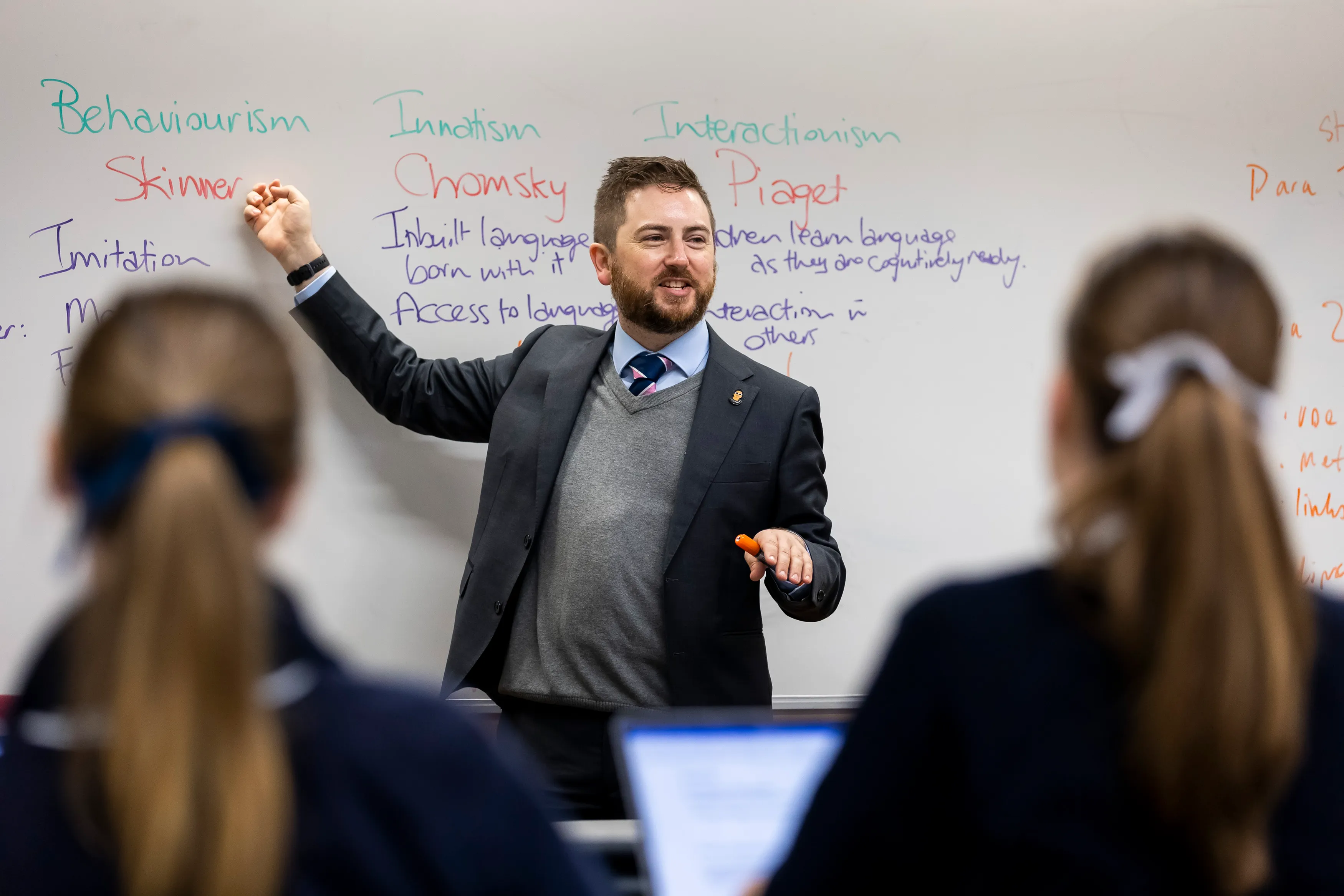

Executive Director, Research and Innovation Mr Luke Francis teaching Senior Years English Language.



Executive Director, Research and Innovation Mr Luke Francis teaching Senior Years English Language.


Executive Director, Research and Innovation Mr Luke Francis teaching Senior Years English Language.

The 2024 staff professional learning text is Johann Hari’s book Stolen Focus. Whilst not a book explicitly about teaching and learning, it helps us to contextualise the pressures our community is facing and stimulate ideas around how we might reimagine our relationships with technology. In the text, Hari explores and posits a range of contributing factors that impact our ability to maintain focus, sharing interviews, reflections, and stories to demonstrate his points.
The foundation of professional learning derived from the concepts in the book have taken two distinct exploratory pathways thus far:
1. Using the Text to Drive Discussion
Our first interaction with the text this year took the form a panel discussion, drawing on expertise from within our teaching staff to explain and unpack some of the ideas developed in the text. As a staff, we learnt the basics of behaviourism, Csikszentmihalyi’s concept of flow, the role of nutrition in allowing our bodies to function optimally, the importance of switching off, and we explored some of the different philosophical approaches to determinism and free will.
Staff were invited to ask questions, deepen their knowledge, and ensure that they were understanding and connecting with the central ideas being presented in the text. The conversations were able to continue and spill over to staff rooms, lunch rooms, and to facilitate connections amongst staff with both the text and each other. Not all ideas presented rang true for all staff, so respectful debate ensued – an essential ingredient to healthy discourse amongst professionals in any industry but specifically important in schools. Fundamentally, the premise lies in fostering teams that can engage in healthy debate. It ensures that ideas are challenged and stretched to best meet their intended goals and avoid complacency and ‘group think’ (Janis 1972).
2. Impacts on Students
Learning of this kind contributes to the fabric of our School and our culture. Importantly, it also flows down to inform teaching practice and thus enhances learning for our students. It instils a learning culture, shared values and a safe environment where our Grammarians are enriched. As their teachers keep up to date on the latest trends externally, so too does learning from each other within the School, propagate best practice across individual classrooms.
This is evidenced through our past work with Dr Jared Cooney-Horvath who affected how presentations are created. We can see similar impact through this stimulus with staff already taking on the ideas central to Hari’s Stolen Focus in their approach to their work. Their focus is to ensure that the best possible versions of themselves are always in front of our Grammarians. This may include, but is not limited to, drawing on positive reinforcement, providing greater opportunities to induce a state of flow, switching off and empowering our students to do the same when appropriate, or rethinking approaches to nutrition and philosophical perspectives.
Hord and Roy (2013) highlight the importance of intentional collaborative learning to support the ongoing development, but also longevity of staff. As we retain excellent staff for longer, our students are the benefactors of this increase in skills and knowledge. Further, as staff model and integrate effective and intentional collaborative learning in their classrooms, our students are continuing to develop their learning, paving the way for career success beyond the red brick walls and making headway into their brightest possible futures.
The 2024 staff professional learning text is Johann Hari’s book Stolen Focus. Whilst not a book explicitly about teaching and learning, it helps us to contextualise the pressures our community is facing and stimulate ideas around how we might reimagine our relationships with technology. In the text, Hari explores and posits a range of contributing factors that impact our ability to maintain focus, sharing interviews, reflections, and stories to demonstrate his points.
The foundation of professional learning derived from the concepts in the book have taken two distinct exploratory pathways thus far:
1. Using the Text to Drive Discussion
Our first interaction with the text this year took the form a panel discussion, drawing on expertise from within our teaching staff to explain and unpack some of the ideas developed in the text. As a staff, we learnt the basics of behaviourism, Csikszentmihalyi’s concept of flow, the role of nutrition in allowing our bodies to function optimally, the importance of switching off, and we explored some of the different philosophical approaches to determinism and free will.
Staff were invited to ask questions, deepen their knowledge, and ensure that they were understanding and connecting with the central ideas being presented in the text. The conversations were able to continue and spill over to staff rooms, lunch rooms, and to facilitate connections amongst staff with both the text and each other. Not all ideas presented rang true for all staff, so respectful debate ensued – an essential ingredient to healthy discourse amongst professionals in any industry but specifically important in schools. Fundamentally, the premise lies in fostering teams that can engage in healthy debate. It ensures that ideas are challenged and stretched to best meet their intended goals and avoid complacency and ‘group think’ (Janis 1972).
2. Impacts on Students
Learning of this kind contributes to the fabric of our School and our culture. Importantly, it also flows down to inform teaching practice and thus enhances learning for our students. It instils a learning culture, shared values and a safe environment where our Grammarians are enriched. As their teachers keep up to date on the latest trends externally, so too does learning from each other within the School, propagate best practice across individual classrooms.
This is evidenced through our past work with Dr Jared Cooney-Horvath who affected how presentations are created. We can see similar impact through this stimulus with staff already taking on the ideas central to Hari’s Stolen Focus in their approach to their work. Their focus is to ensure that the best possible versions of themselves are always in front of our Grammarians. This may include, but is not limited to, drawing on positive reinforcement, providing greater opportunities to induce a state of flow, switching off and empowering our students to do the same when appropriate, or rethinking approaches to nutrition and philosophical perspectives.
Hord and Roy (2013) highlight the importance of intentional collaborative learning to support the ongoing development, but also longevity of staff. As we retain excellent staff for longer, our students are the benefactors of this increase in skills and knowledge. Further, as staff model and integrate effective and intentional collaborative learning in their classrooms, our students are continuing to develop their learning, paving the way for career success beyond the red brick walls and making headway into their brightest possible futures.
The 2024 staff professional learning text is Johann Hari’s book Stolen Focus. Whilst not a book explicitly about teaching and learning, it helps us to contextualise the pressures our community is facing and stimulate ideas around how we might reimagine our relationships with technology. In the text, Hari explores and posits a range of contributing factors that impact our ability to maintain focus, sharing interviews, reflections, and stories to demonstrate his points.
The foundation of professional learning derived from the concepts in the book have taken two distinct exploratory pathways thus far:
1. Using the Text to Drive Discussion
Our first interaction with the text this year took the form a panel discussion, drawing on expertise from within our teaching staff to explain and unpack some of the ideas developed in the text. As a staff, we learnt the basics of behaviourism, Csikszentmihalyi’s concept of flow, the role of nutrition in allowing our bodies to function optimally, the importance of switching off, and we explored some of the different philosophical approaches to determinism and free will.
Staff were invited to ask questions, deepen their knowledge, and ensure that they were understanding and connecting with the central ideas being presented in the text. The conversations were able to continue and spill over to staff rooms, lunch rooms, and to facilitate connections amongst staff with both the text and each other. Not all ideas presented rang true for all staff, so respectful debate ensued – an essential ingredient to healthy discourse amongst professionals in any industry but specifically important in schools. Fundamentally, the premise lies in fostering teams that can engage in healthy debate. It ensures that ideas are challenged and stretched to best meet their intended goals and avoid complacency and ‘group think’ (Janis 1972).
2. Impacts on Students
Learning of this kind contributes to the fabric of our School and our culture. Importantly, it also flows down to inform teaching practice and thus enhances learning for our students. It instils a learning culture, shared values and a safe environment where our Grammarians are enriched. As their teachers keep up to date on the latest trends externally, so too does learning from each other within the School, propagate best practice across individual classrooms.
This is evidenced through our past work with Dr Jared Cooney-Horvath who affected how presentations are created. We can see similar impact through this stimulus with staff already taking on the ideas central to Hari’s Stolen Focus in their approach to their work. Their focus is to ensure that the best possible versions of themselves are always in front of our Grammarians. This may include, but is not limited to, drawing on positive reinforcement, providing greater opportunities to induce a state of flow, switching off and empowering our students to do the same when appropriate, or rethinking approaches to nutrition and philosophical perspectives.
Hord and Roy (2013) highlight the importance of intentional collaborative learning to support the ongoing development, but also longevity of staff. As we retain excellent staff for longer, our students are the benefactors of this increase in skills and knowledge. Further, as staff model and integrate effective and intentional collaborative learning in their classrooms, our students are continuing to develop their learning, paving the way for career success beyond the red brick walls and making headway into their brightest possible futures.

Want to know more about our professional reading text for 2024? Click this link to visit Hari's website or pick up a copy of Stolen Focus: Why you can't pay attention at your local bookstore.
References:
Janis, I. L. (1972). Victims of groupthink: A psychological study of foreign-policy decisions and fiascoes. Houghton Mifflin.
Hord, S. & Roy, P. (2013). 'Creating Learning Communities'. Reach the Highest Standard in Professional Learning: Learning Communities. SAGE Publications, p.19-60.
Shulman, L. (1987). 'Knowledge and teaching: Foundations of the new reform'. Harvard educational review, 57(1), p.1-23.
Want to know more about our professional reading text for 2024? Click this link to visit Hari's website or pick up a copy of Stolen Focus: Why you can't pay attention at your local bookstore.
References:
Janis, I. L. (1972). Victims of groupthink: A psychological study of foreign-policy decisions and fiascoes. Houghton Mifflin.
Hord, S. & Roy, P. (2013). 'Creating Learning Communities'. Reach the Highest Standard in Professional Learning: Learning Communities. SAGE Publications, p.19-60.
Shulman, L. (1987). 'Knowledge and teaching: Foundations of the new reform'. Harvard educational review, 57(1), p.1-23.
Want to know more about our professional reading text for 2024? Click this link to visit Hari's website or pick up a copy of Stolen Focus: Why you can't pay attention at your local bookstore.
References:
Janis, I. L. (1972). Victims of groupthink: A psychological study of foreign-policy decisions and fiascoes. Houghton Mifflin.
Hord, S. & Roy, P. (2013). 'Creating Learning Communities'. Reach the Highest Standard in Professional Learning: Learning Communities. SAGE Publications, p.19-60.
Shulman, L. (1987). 'Knowledge and teaching: Foundations of the new reform'. Harvard educational review, 57(1), p.1-23.





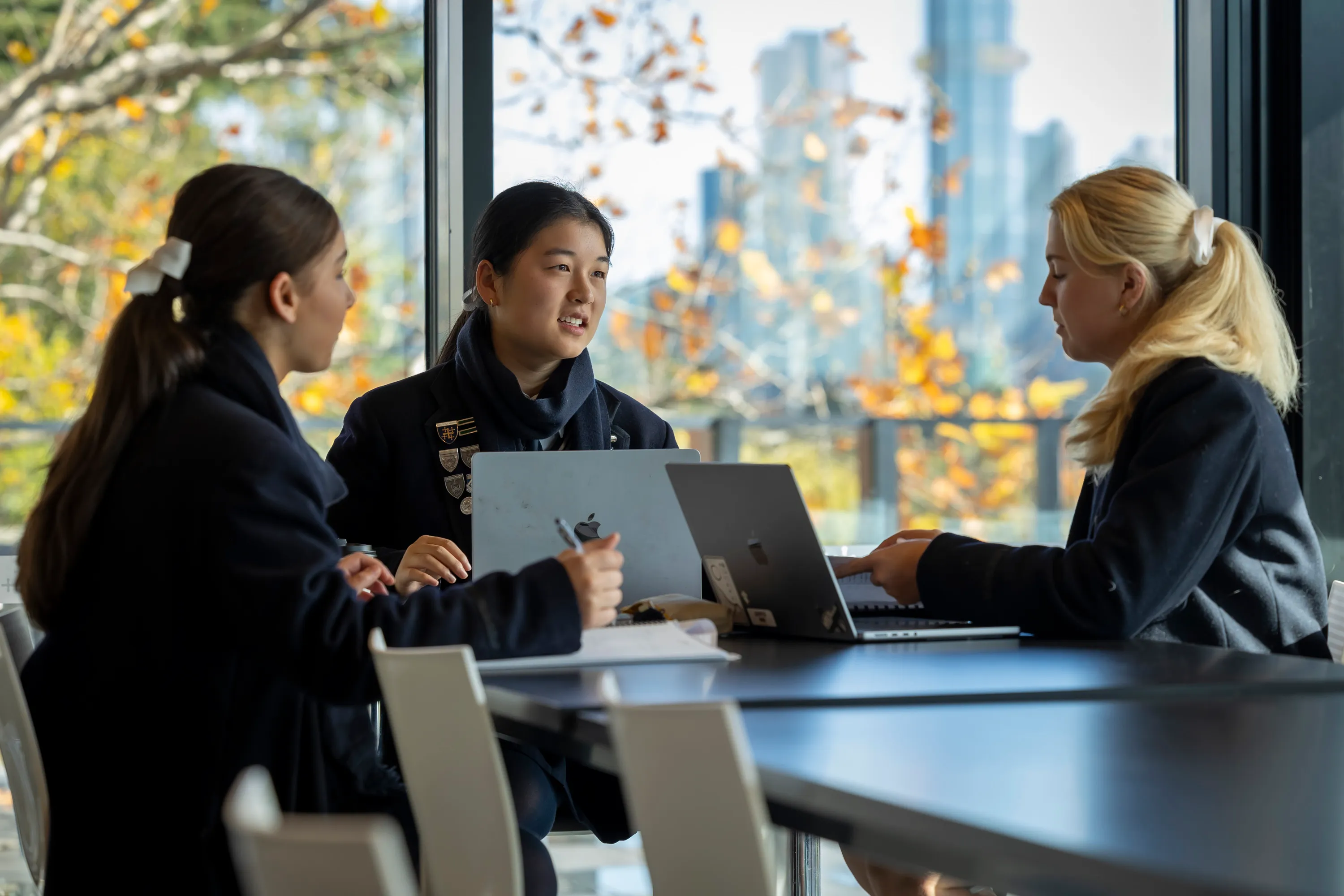

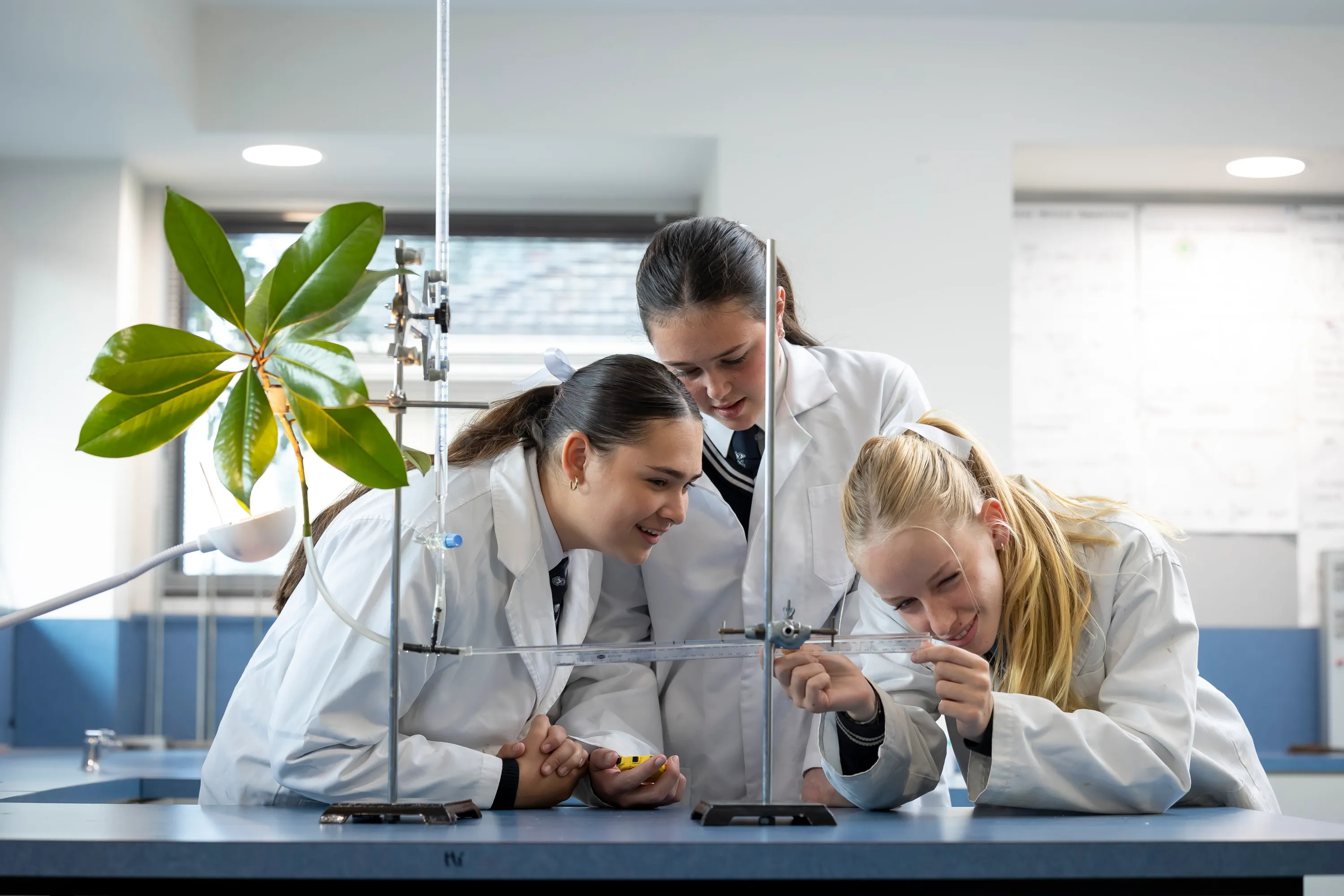

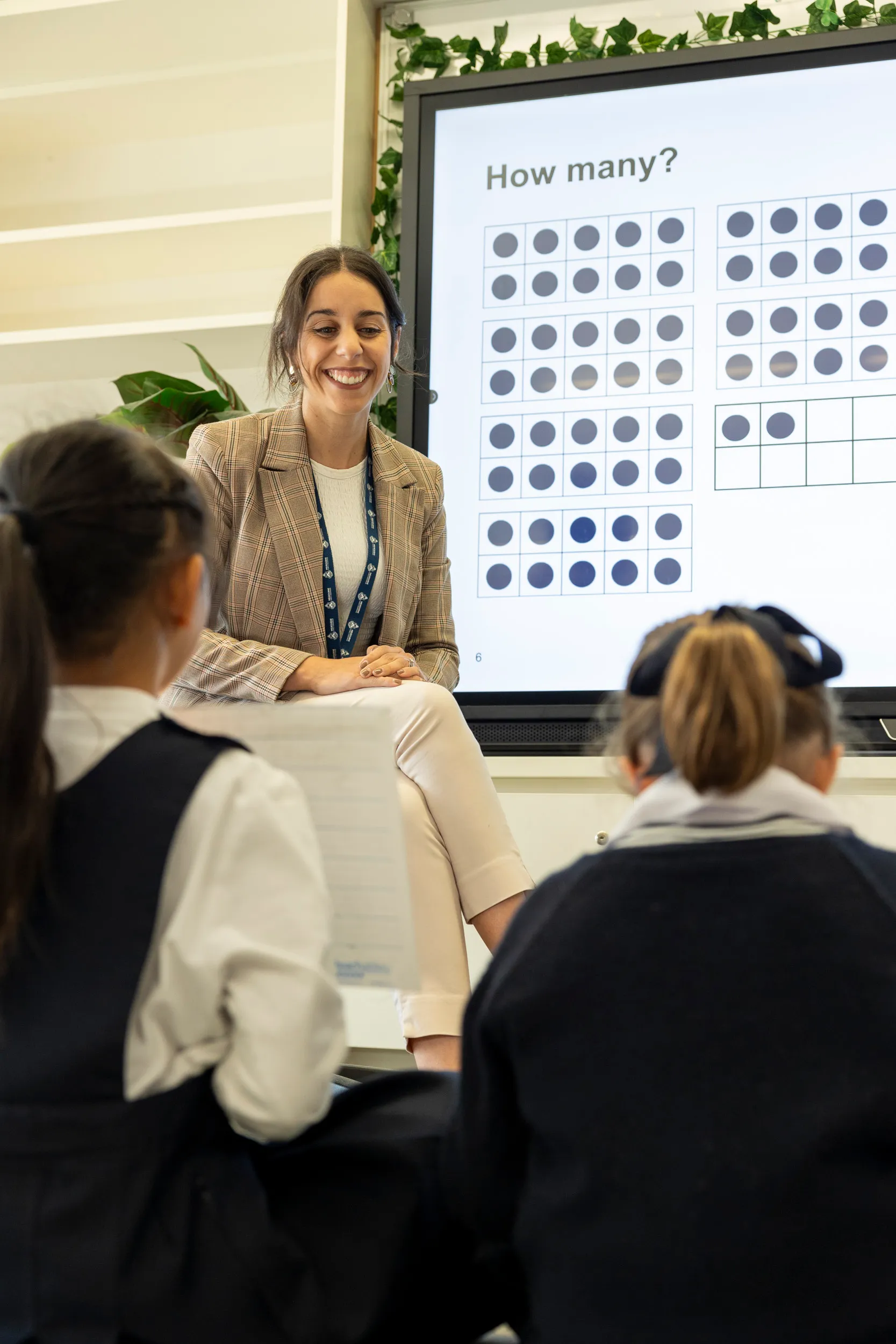
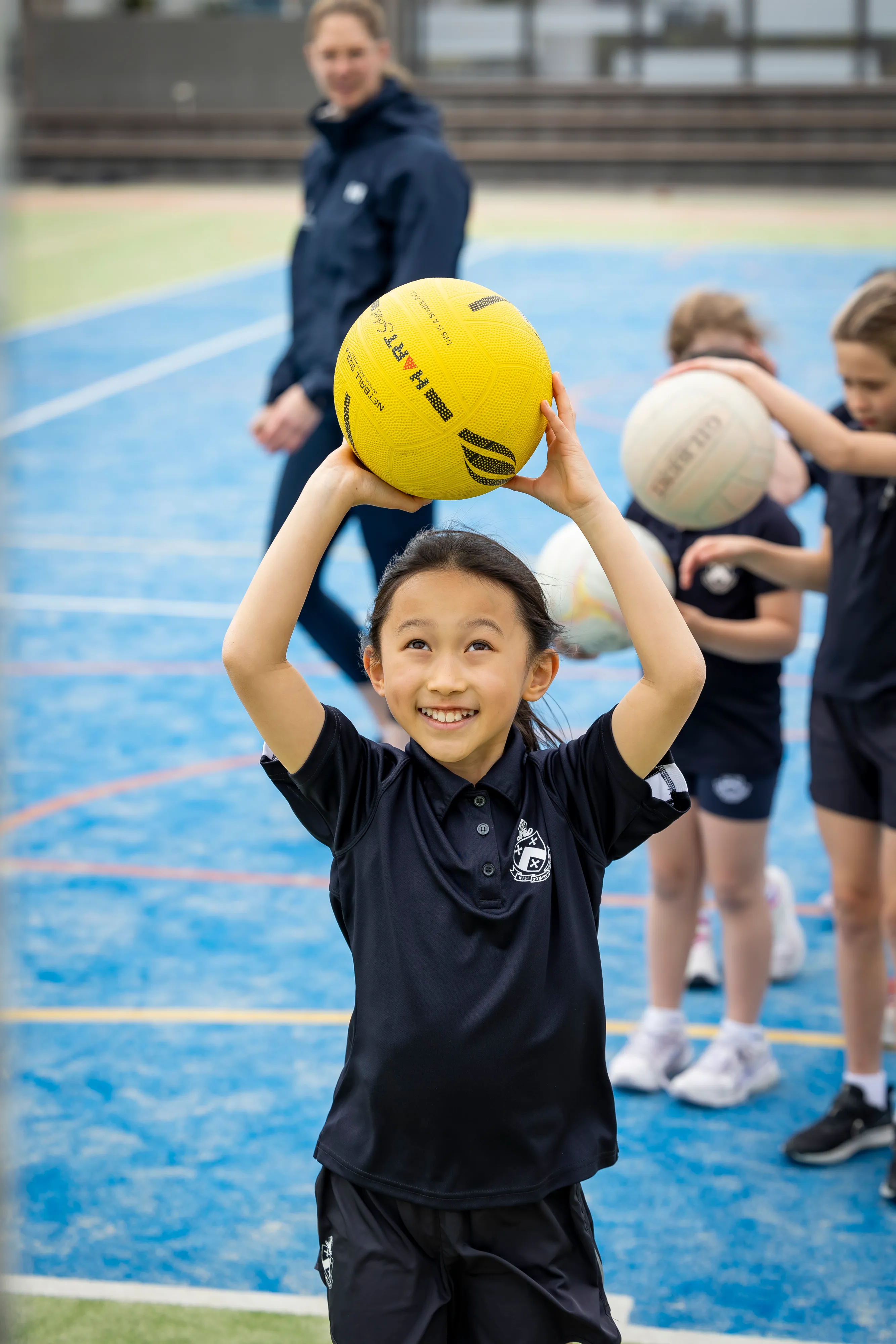
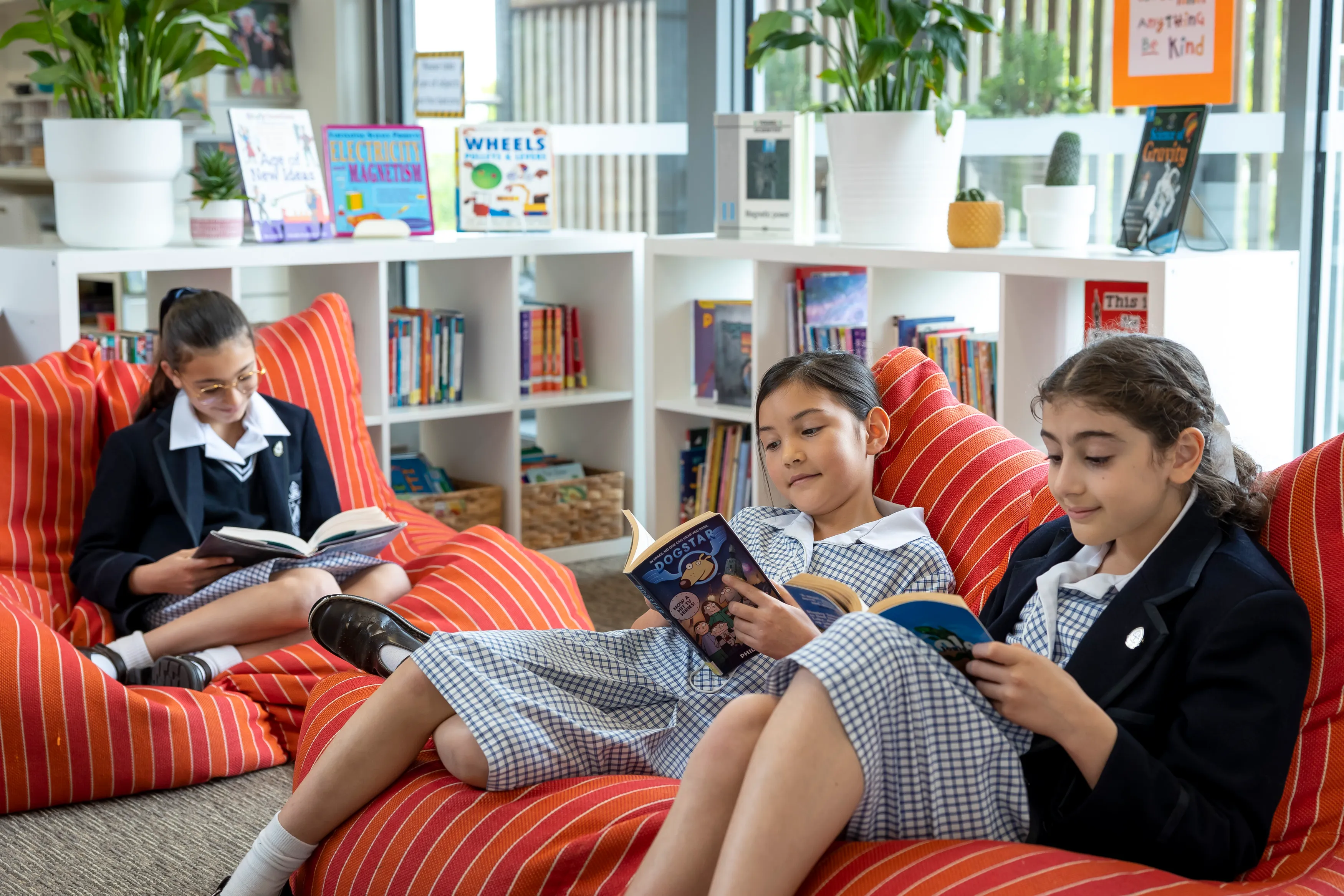
.jpg)
